- Shares
- 40
Think Wes Anderson and stylish and quirky come to mind, complete with a strong cast of memorable characters in a way only he can, and with The French Dispatch, the 52 year old auteur weaves another delectable layered tale that is beautiful and immersive, but somehow falls short of delivering.
Set in post-war France, The French Dispatch is a 103 minutes collection of short stories brought to life. Following the death of magazine editor Arthur Howitzer Jr., played by Anderson’s favourite, Bill Murray, a team of journalists, a cartoonist and a copy-editor come together to produce one final issue of the magazine before it will cease to exist. As written in Howitzer’s will, the final issue should include three republished articles from past editions, along with an obituary.
Each chosen story plays as an anthology episode, with the writer responsible for the piece narrating it. Although there are only three main stories in the movie, the movie has a total of five sections to it including an introduction story titled ‘The Cycling Reporter’ narrated by travel writer Herbsaint Sazerac (Owen Wilson) and the ending of the movie ‘Orbituary’ by the magazine staff.
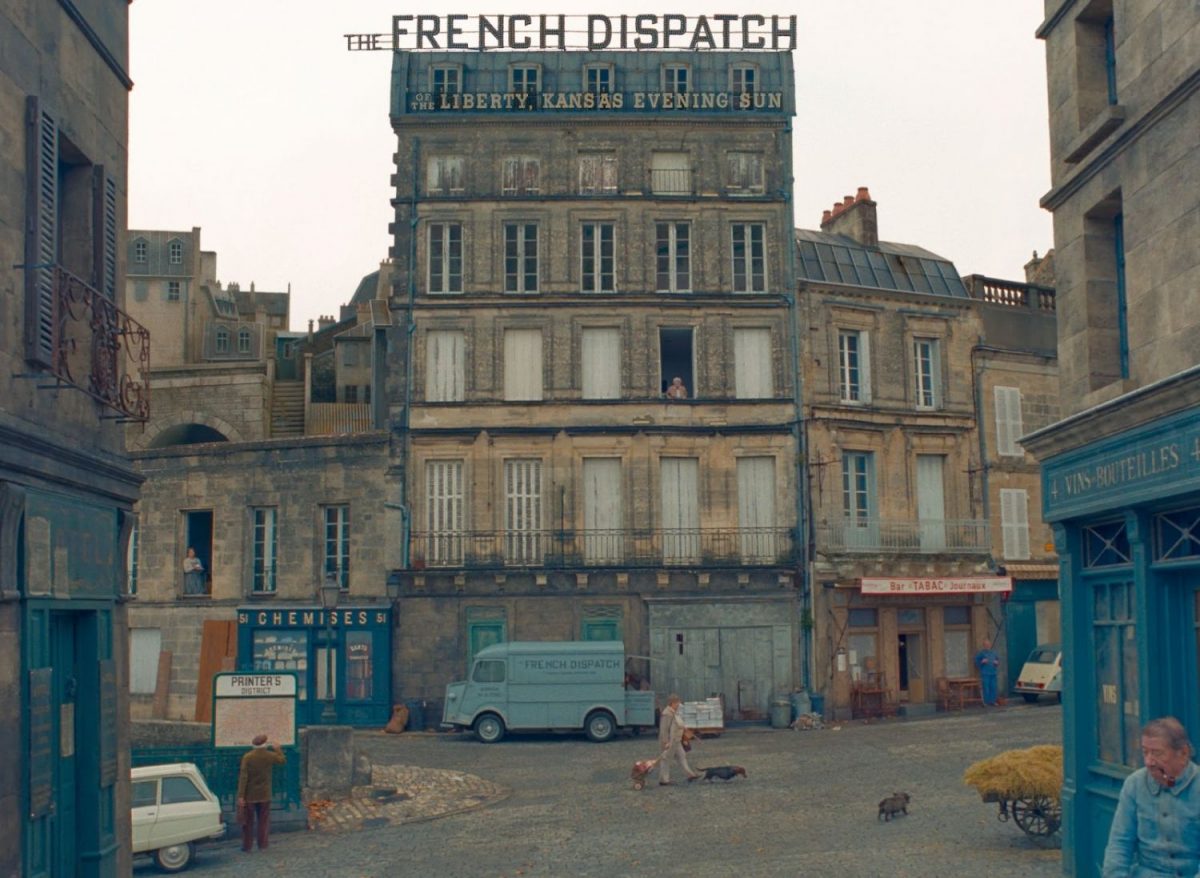
‘The Cycling Reporter’ sees Sazerac cycle through a little French town, reporting on the town’s not so great history via hyperboles. Sazerac colorfully describes various locations and residents of the town with clever wordplay and broad physical comedy. Although the introduction lacks any sort of conflict, Wilson is compelling and easily pulls viewers in.
Plus, ‘The Cycling Reporter’ introduces viewers to Anderson’s filmmaking style if they’re new to the director. Anderson loves perfect symmetry and using wide shots to show off the vast space and location. Anderson’s style often makes a viewer feel like they’re peering through a glass window into an idyllic and quirky world, coupled with a colour scheme that ping pongs between soft pastel palette and black and white. It’s direct-directing, so you see what he wants you to see. Don’t expect follow-shots like you would in an action film or any sort of cuts or jumpscares like you would see in a horror – instead think of a theatre production, where elements such as characters and buildings etc are constantly being rolled in and pulled out of stage, except it’s a stagnant frame on the silver screen – that’s a Wes Anderson movie.
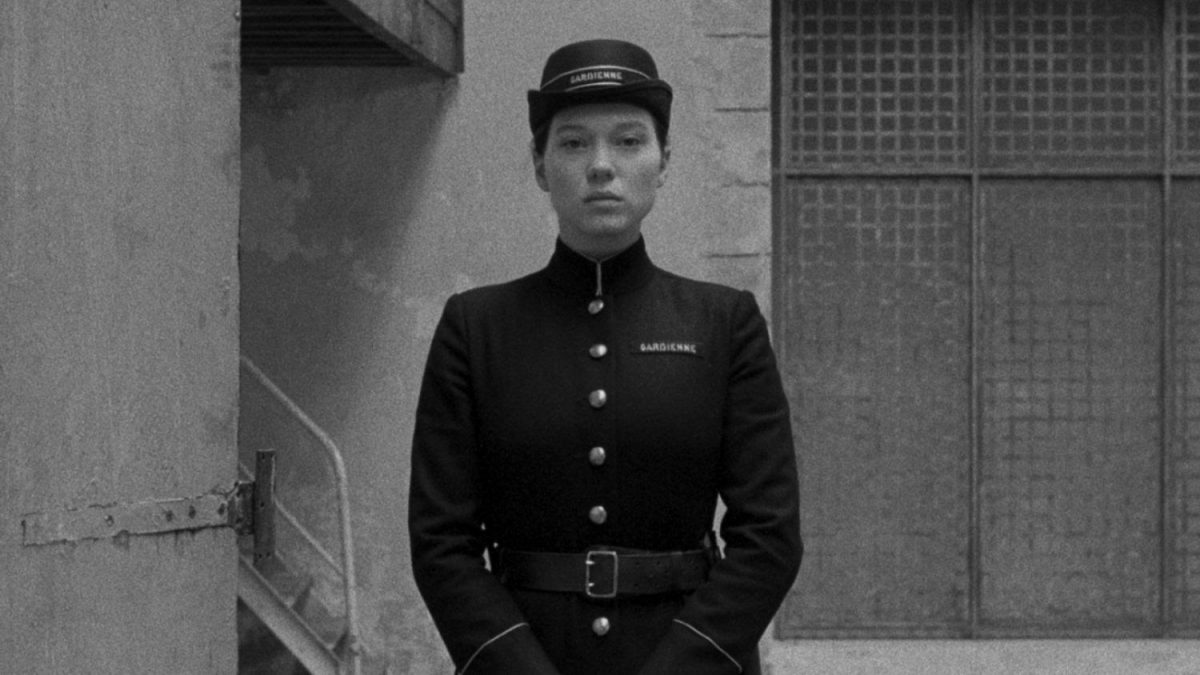
The next story, ‘The Concrete Masterpiece’ by J.K.L. Berensen (Tilda Swinton) sees the French Dispatch staff writer recount the exploits of Moses Rosenthaler (Benicio del Toro), an imprisoned artist who becomes a sensation to the outside world. Adrien Brody plays a similarly imprisoned art dealer and Léa Seydoux is a prison guard who is also Rosenthaler’s muse and lover. A strong story on art, love and a tortured artist, we’d argue the masterpiece of ‘The Concrete Masterpiece’ is Seydoux’s performance as prison guard Simone. Although the story took up an estimate of 20 minutes to tell, Seydoux’ performance as a mysterious, cold and commitment-phobe lover to Rosenthaler was far much more engaging than her No Time To Die outing. Plus, the chemistry between Seydoux and del Toro, bearded and self-destructive, was incredibly intoxicating and believable, unlike the chemistry (or lack thereof) between her and Daniel Craig throughout that almost three hour spy movie.
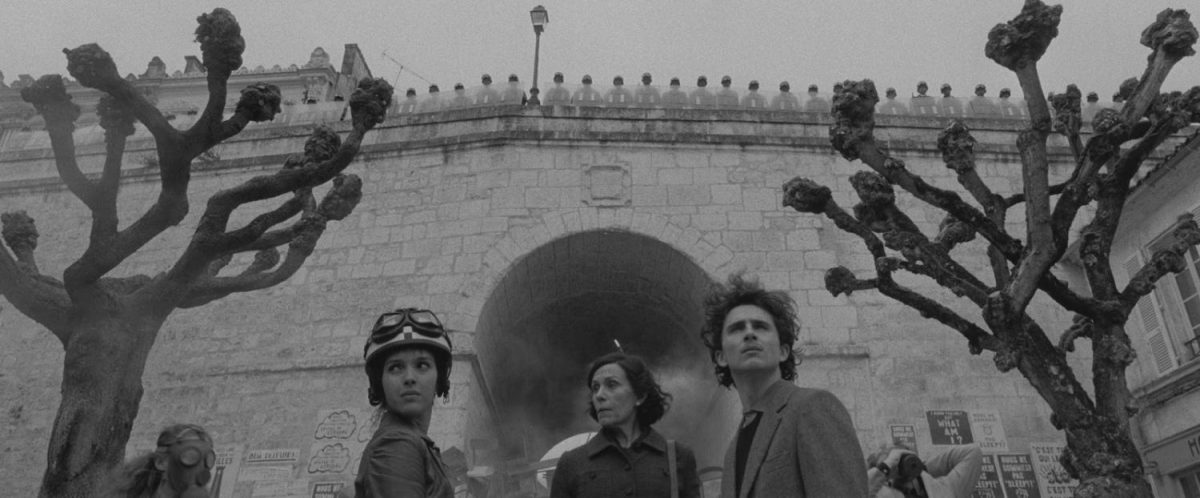
The third, ‘Revisions to a Manifesto’, sees Dune star Timothée Chalamet as Zeffirelli, a young student leading a revolution against their local government, involving a police-standoff slash chess match between a group of teens and the authorities. Written and told by Lucinda Krementz (Frances McDormand), ‘Revisions to a Manifesto’ focuses much less on the ‘what is actually happening’ i.e. the movement, but on Krementz’ journalistic integrity. Initially there to report on the movement, Krementz finds herself in a relationship with Zeffirelli and copyediting his manifestos. Tucked in the middle of The French Dispatch, ‘Revisions to a Manifesto’ is quite forgettable but gives great insight into Chalamet’s acting skills. Chalamet, cinema’s current ‘it boy’, recently gave an impressive performance as Paul Atreides in Dune and will soon debut as Willy Wonka. His performance as Zeffirelli is just another side of him we’ve not yet seen, but again, isn’t as memorable as Seydoux and del Rio.
Saving the best for last, Roebuck Wright’s (Jeffrey Wright) ‘The Private Dining Room of the Police Commissioner’ is a food piece that started off with a feature on Chef Nescafe (Stephen Park), a personal chef of The Commissaire (Mathieu Amalric) that then later turns into a coverage on the kidnapping of The Comissaire’s son. With a talented ensemble cast, including Edward Norton as one of the kidnappers, Willem Dafoe as a prisoner and Saoirse Ronan as a loathsome showgirl, ‘The Private Dining Room’ is an ingenious, gleefully unhinged and dynamic installment in the movie. Fitting comedy and drama in one story, coupled with a car chase rendered in newspaper comic-style animation, ‘The Private Dining Room of the Police Commissioner’ will have viewers falling in love with Anderson’s storytelling and cinematography (if they haven’t already).
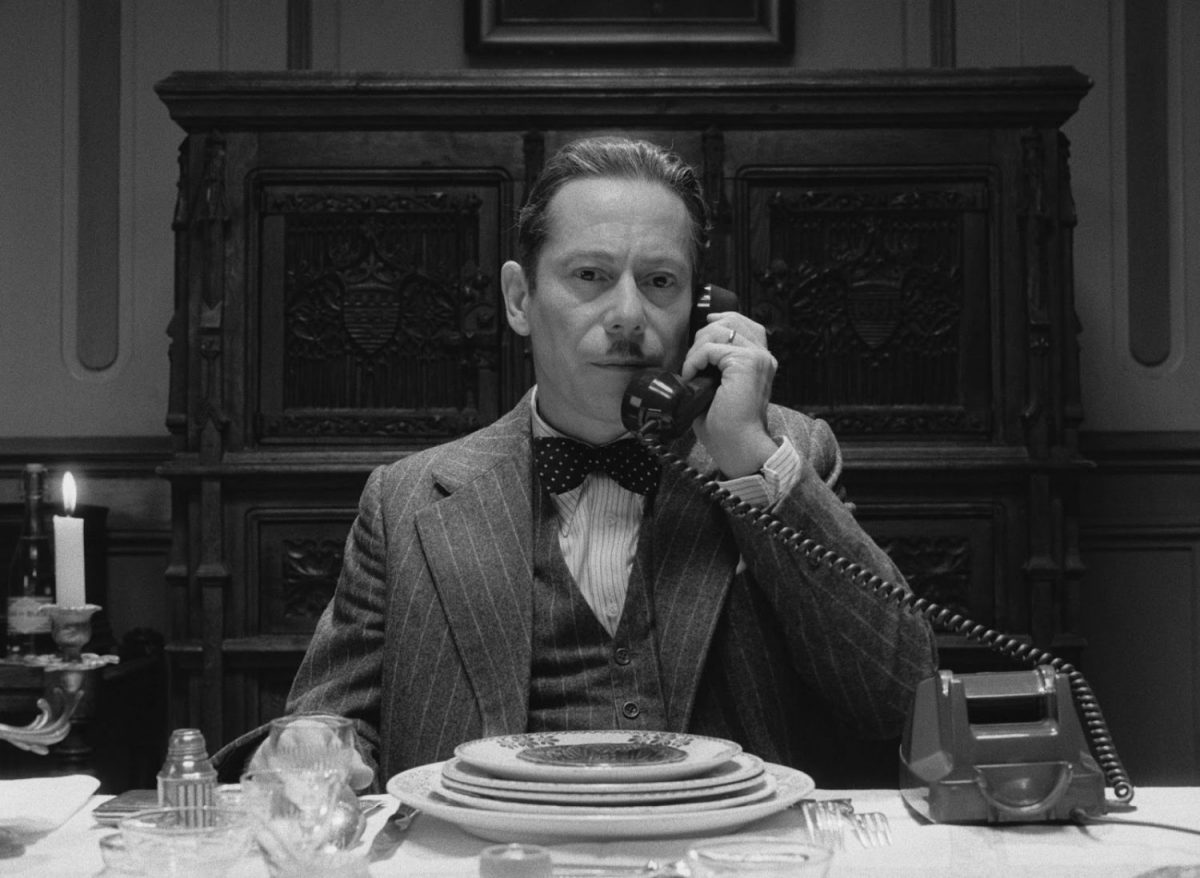
Wrapping up with ‘Obituary’ where all previously mentioned writers are joined with copyeditor Alumna (Elisabeth Moss), this section sees the staff mourn the death of their editor and come together to put together – yep, you guess it – an obituary. This portion isn’t exciting or full of comedy and action like all the previously told stories, but it’s rather emotional. Again, if you haven’t fully understood what the point of The French Dispatch is because you’re so lost in all the ‘Wes Anderson sauce’ a.k.a the pleasing aesthetics, obituary will bring you back to the centre and have you realise that The French Dispatch is a love letter to journalists.
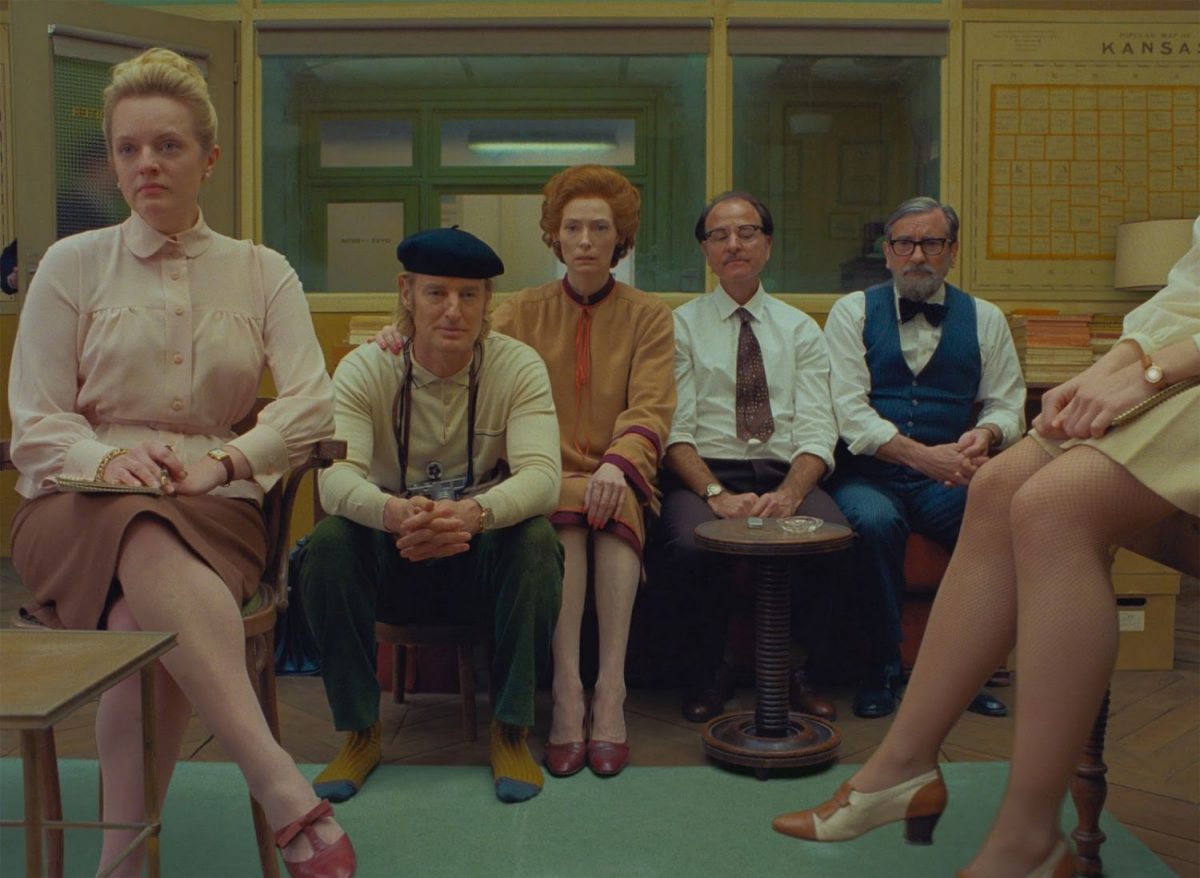
The journalists who can see from different angles and point of views when it comes to boring towns, how one’s writing can humanise and even make one fall in love with a supposed killer, how journalists tango between their emotions and being objective when reporting and how sometimes, a seemingly straightforward story can turn into a gourmet meal with the right spices and drizzle.
The French Dispatch may not be for everyone, especially if you’re not particularly into long-drawn-out films that have a unique storytelling method like Anderson’s. The French Dispatch isn’t what one would call a Hollywood hit or a blockbuster must-see, but it’s a beautiful piece of art for those who appreciate cinematography and style.
Written by Anderson himself, the movie has the director’s values written all over it. Stories are direct, curious, quirky and there’s that touch of magic you just can’t put a finger on. With some stories stronger than others, viewers are bound to leave with a favourite that will stay with them even after the credits roll. And if none of the stories stick with you, you can’t deny that The French Dispatch has an impressive cast that know how to make it a good time, from the likes of Tilda Swinton, Elisabeth Moss, Owen Wilson, Jeffrey Wright, Léa Seydoux and more.
GEEK REVIEW SCORE
Summary
The French Dispatch is Wes Anderson’s love letter to journalists. Quirky and stylish, the film will earn a special place in the heart of writers and aesthetic lovers.
Overall
7/10-
Story - 6/10
6/10
-
Direction - 9/10
9/10
-
Characterisation - 7/10
7/10
-
Geek Satisfaction - 6/10
6/10













